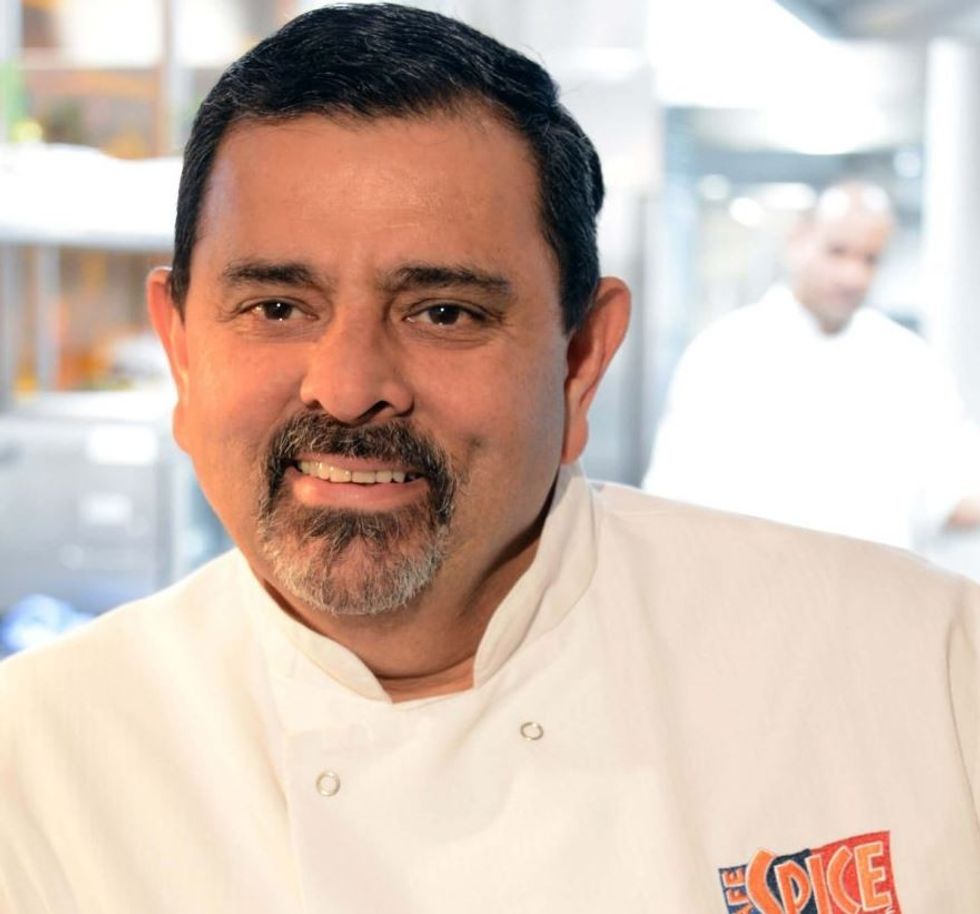SOUTH ASIAN cuisine is going more green during the cost of living crisis, with restaurants turning away from charcoal and gas ovens.
More eateries are using large combination electric cookers, rather than a tandoor oven, which can cook chicken, lamb and naan together, according to owners.
The industry has largely binned charcoal tandoor ovens and the next eco-trends are set to be electric ovens, phasing out plastic and reducing food waste – amid rising energy bills and the cost of meat and ingredients soaring in recent months.
Ravinder Bhogal’s London restaurant Jikoni was the first independent UK eatery to go carbon neutral in 2021 by switching exclusively to local sustainable suppliers, using green gas and partnering with an organisation to help turn non-recyclable restaurant waste into green energy. Chef Cyrus Todiwala OBE said he abandoned charcoal tandoors at his Cafe Spice Namaste restaurant, because it was causing too much damage in the kitchen.
He is installing an electric tandoor in his new training kitchen in east London.
The food author, who owns restaurants in London, told Eastern Eye: “Charcoal swallows oxygen like no other and if gas cookers are nearby, you are bound to get yellow flames as the air is devoid of the right levels of oxygen.
“This also has an impact on the people working on or near them, so we decided years ago to switch to gas, which is not as great flavour-wise, naturally, but very clean and controllable.
“But gas has its own issues too and does create air pollution too. The next step forward for us is to go for an electric tandoor which will go into our new training kitchen.
“At the moment since we have not got gas into the building; we are making all our kebabs using a Panasonic SCV2 High Speed Combination oven – the speed and efficiency is second to none and our meat is cooked perfectly, losing no moisture or very, very little, making the meat juicier and tender.”
Research has shown that an estimated one-third of the food produced in the world ends up as waste, which then contributes nearly 10 per cent of global greenhouse gas emissions.
Todiwala added: “We keep an outdoor gas tandoor for making our naan, which we regenerate in the SCV2 which keeps our kitchen cool, clean and odour free.
“Our kitchen extraction system is clean and spic and span, plus the advent of fire risk is now greatly reduced.
“It’s not for everyone, as the oven is not cheap and costs up to £3,500 compared to a tandoor that could be much less or half the price, but you do save on consumables and energy on the SCV2.”
Ruhul Tarafder, who runs Jhal Chilli takeaway in Kent, said he has seen a handful of south Asian restaurants buy large combination ovens for around £5,000. He told Eastern Eye, “With the large specialist oven, it’s more automated, you preset everything and it cooks chicken, seekh kebabs, naan.
“You don’t need a tandoor or tandoor chef, so you are saving on staffing costs.
“The community can be slow to change and the industry hasn’t seen the benefit of these ovens.
“I saw it up north and I was like, ‘wow’.
“It would take time to get used to it, but restaurant owners would move towards it I think as it is better for the environment and could perhaps save gas.”
Tarafder, who also runs a merchandising firm that supplies to south Asian restaurants, added: “Nobody I know uses coal for tandoor ovens for a good few years now. It would be difficult to tell the taste unless you were a connoisseur. Gas is also quicker.”
Other restaurants which have gone down the green route include Crispy Dosa in Windsor, Berkshire, which serves a “sustainable plant-based” menu; Crafty Indian in Shipley, West Yorkshire, stopped using single-use plastic items while Queen Mumtaz in Bournemouth, Hampshire, did not use plastic for its refurbishment. The Shish Mahal in Glasgow trialled the UK’s first drone delivery service in 2021 to reduce its carbon footprint.

At Mowgli, the Indian restaurant group owned by Nisha Katona, each eatery has a “Sustainability Sergeant” with the team organising local fund-raising events, focusing on energy usage, and sustainable sourcing. The company, which recently opened sites in Brighton and Edinburgh, is planning to open an eatery in Bristol this summer.
Katona, whose restaurant group recently secured investment from TriSpan, said: “We do things that a lot of restaurants do not and a lot of investors don’t understand that, and they would say our food should be cooked at a central kitchen and then delivered across the UK.
“But Mowgli is all about the food being prepared on site by experts, and they know how important it is for the food to remain fresh. Not many backers understand why we donate so much to charity, either. But our new partners do understand the business and so I chose them.”
Government figures in February showed wood-burning stoves and open fires in homes are now Britain’s biggest source of particulate air pollution.
About 200,000 wood stoves are installed in homes every year due to the surge in gas prices. The Stove Industry Alliance said sales of wood burners rose 66 per cent in the third quarter of 2022.
Juliane Caillouette-Noble, of the Sustainable Restaurant Association, was quoted as telling Waitrose magazine: “The turbulence caused by sky-rocketing prices and the scarcity of chefs presents a taste of what we can expect as the impact of climate change affects food production. It’s also giving chefs an opportunity to showcase their creativity and innovation, using all of every ingredient available and focusing on the finest produce.




















